Rod Raglin's Blog, page 10
February 17, 2024
Bigfoot Country Anthology Kickstarter Campaign is offering significant savings for authors on Manuscript Assessments and full Book Editing.
Alex McGilvery, author and owner of Celticfrog Publishing, has chosen excerpts from my novel, FOREST – Love, Loss, Legend, to include in Bigfoot Country, an anthology of stories about “Sasquatch, Bigfoot, Yeti and more as people encounter them in remote locations or their own backyard.”
To offset the costs of editing and publishing this exciting project, Alex has begun a Kickstarter campaign.
A minimum donation of $10 gets you the e-book edition, $20 donation an ebook plus the printed edition (paperback).
For a more significant contribution, Alex is offering rewards that could save authors hundreds, maybe even thousands of dollars, including:
Manuscript Assessment by Celticfrog for a contribution of (CA) $100
Get a full professional assessment of your manuscript up to 50,000 words. Amount can be negotiated if your word count is higher. Assessment will be completed within 30 days of submission. Can be claimed up to January 2025.
Full Content Edit of your book by (CA) $500
Get a full content edit of your book. It starts with a manuscript assessment, but includes chapter comments and a full second pass looking at your prose and how it can strengthen your story. This second pass comes after your revisions based on the advice from the first read through. You have a full year from the end of the campaign to start your edit. There is no time limit to completing the edit
Here’s the link. https://www.kickstarter.com/projects/alexmcgilvery/bigfoot-county?fbclid=IwAR3p2PBbiRrfe93espm_GE-jtEWFT_dUBF9CugVqssTRgFjWzop4bYs14mA
The book is formatted and being proofread for publication in May 2024.
#sasquatch #yeti #Bigfoot #missinglink #monsters #wilderness #forest @celticfrog @alexmcgilivery #mystery #myth #bigfootanthology #sasquatchstories #bigfootstories
February 10, 2024
Support Kickstarter campaign to fund Bigfoot anthology
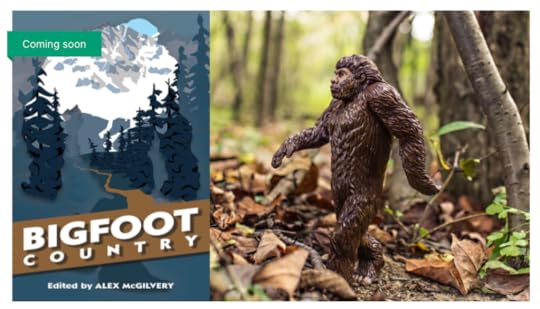
If you’ve ever spent time in the deep woods of the Pacific Northwest, you’ve probably had that eerie feeling that something is watching you. Then there’s the sound of the rustle of leaves when there’s no breeze, the shape that emerges from the shadows then quickly disappears. Is that rhythmic knocking sound a signal or just a branch striking a nearby trunk? And that impression in the gravel by the creek, something definitely was there, but what?
This is how the protagonist in my novel, FOREST – Love, Loss, Legend, explains it. “The forest presented an impenetrable wall of green and made it easy to imagine no human had ever set foot a hundred metres on either side of the road. Species could come to life, thrive and die without anyone except God ever knowing they existed.”
Have they? Are they still?
Alex McGilvery, author and owner of Celticfrog Publishing, has chosen excerpts from FOREST to include in Bigfoot Country, an anthology of stories about “Sasquatch, Bigfoot, Yeti and more as people encounter them in remote locations or their own backyard.”
I hope you’ll consider supporting his Kickstarter campaign to offset the costs of editing and publishing this exciting project. Who knows, there may even be some residual funds to compensate the authors.
A minimum donation of $10 will also get you the e-book edition, $20 donation an ebook plus the printed edition (paperback). The book is formatted and being proofread for publication in May 2024.
Here’s the link.
#sasquatch#yeti#Bigfoot#missinglink#monsters#wilderness#forest @celticfrog @alexmcgilivery #mystery#myth#bigfootanthology#sasquatchstories#bigfootstories
February 7, 2024
Bigfoot Country Anthology
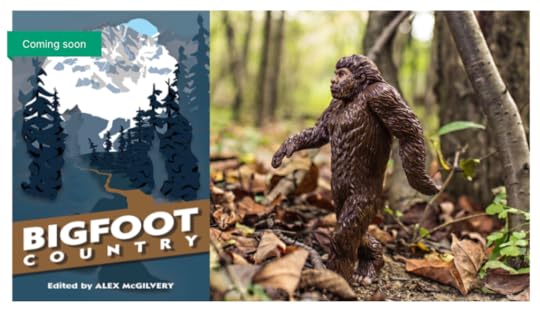
Thanks to Alex for including excerpts from my novel, FOREST – Love, Loss, Legend, being featured in this anthology.
February 2, 2024
My short story, The Least of Light, published in OpenDoor’s Frost & Fire anthology
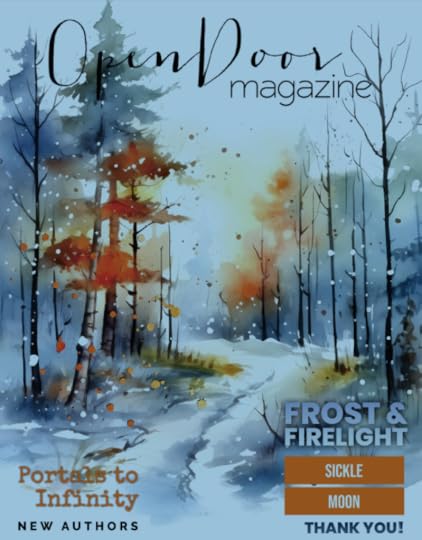
The Least of Light, my short story about an alternative to Christmas, has been published by OpenDoor Magazine in their latest anthology entitled, Frost & Firelight.
The short stories, poetry and images in this beautifully produced publication “seamlessly melds two contrasting yet enchanting facets of this season: the invigorating chill of frost, symbolizing cleansing, and the comforting warmth and safety emanating from a crackling fire.”
The Least of Light is a story about how an old man and his seven-year-old friend come up with an alternative to Christmas, one that celebrates the season and embraces the environment rather than attempting to overcome and diminish it. It is an example of hybrid writing combining poetry and prose.
At OpenDoor Magazine, they “strive to stay a free opportunity for poets, authors, artists, and songwriters to submit to – as well as keeping the magazine free to subscribe. This allows more opportunity for the artists and those who wish to discover them.”
Indeed, you can download a free copy of this very attractive publication at Frost & Firelight You’ll find my story accompanied by one of my photographs beginning on page 49.
How you ask, do co-creators Melanie Haagman and Kassie J. Runyan sustain the publication if it’s free? For more information and to support this endeavor visit their Support Page
@melaniehaagman @kassiejrunyan #opendoormagazine @opendoormagazine #literarymagazine #shortstories #authors #writers #frost&fire
January 23, 2024
Seeking clarification of submission policies for marginalized authors.
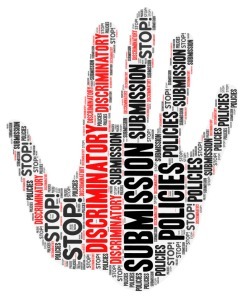
In a continuing effort to understand the submission policies in regard to marginalized writers I have sent letters to a few literary magazines. Here’s one I sent to The Ex-Puritan, whose editor was gracious enough to respond.
MY QUERY:
Can you please explain specifically what this statement on The Ex-Puritan submission page means?
“We are especially interested in work by LGBTQ2S+ writers, BIPOC writers, and writing from other marginalized folks.”
This issue has been discussed in a number of writer forums I’m involved in and the interpretation widely varies. For example:
are you just encouraging writers who identify with marginalized groups to simply submit their work or, are you suggesting their work will receive special consideration? If the latter, what might they be?how do you identify and verify the racial or sexual identity of an author?Thanks in advance for your response. It will help clear up misunderstandings.
RESPONSE:
Dear Rod,
No one is getting any special treatment based on their positionality. Works are chosen based on their quality and on the discretion of the individual editors. However, due to the inequities still present in publishing, we, along with many other magazines, encourage folks from multiple marginalized backgrounds to send in their work to the magazine.
Re your second question, we do not identity (sic) or verify anyone’s background. Authors self-identify if they so choose to. Again, no published work is contingent on the writer’s background, but on the quality of their work.
If you are interested to submit to the magazine, please familiarize yourself with the last few issues to get a feel of the kind of work we publish.
Best,
Sanchari Sur (she/they)
Editor-In-Chief
The Ex-Puritan
http://www.ex-puritan.ca
Though I find this reassuring, I don’t understand it.
Consider:
“Works are chosen based on their quality and on the discretion of the individual editors… we do not identity (sic) or verify anyone’s background. Authors self-identify if they so choose to. Again, no published work is contingent on the writer’s background, but on the quality of their work.”
If this is the case, why state that they are “especially interested in work by LGBTQ2S+ writers, BIPOC writers, and writing from other marginalized folks.”
According to what the editor says it makes no difference whatsoever if the author self-identifies as being from a marginalized group since “no published work is contingent on the writer’s background, but on the quality of their work.”
Is including the statement encouraging marginalized writers to submit their work something necessary to get those government grants and appease funding organizations? Or, is it just gratuitous?
In light of this response, I wondering why a more inclusive statement like this one that appears on the Ampersand Review submission page can’t be used?
“We welcome literary works in any genre or form, and from new or established writers of all backgrounds and identities.”
More questions. No clarity.
The initial post on the Next Door app received at least 1.9K views within 48 hours. I mention this because I was wondering if this issue was of concern to anyone other than myself and a few other authors. I take this obvious validation as interest only – and not necessarily support for my point of view.
And not all of you did. Here’s a comment from Joseph Campbell.
“Diversity support in authors leads to more diversity in editors and publishers, and that leads to windows into cultures we have no personal connection to and that leads to further understanding and connection to other humans.”
If that is the case, then what The Ex-Puritan is offering isn’t helping and leads me to ask is there a better way to achieve what Joseph is suggesting rather than misleading marginalized writers into thinking they’re getting special consideration, while discriminating against other authors?
For context on this issue, please visit Re: Stop discriminatory submission policies at https://www.facebook.com/profile.php?id=100013287676486
This is by no means the final word on this issue. The discussion is ongoing and evolving and your comments are welcomed, will be considered and may alter this position.
Let’s talk.
January 1, 2024
Tell publishers to stop discriminatory submission policies.
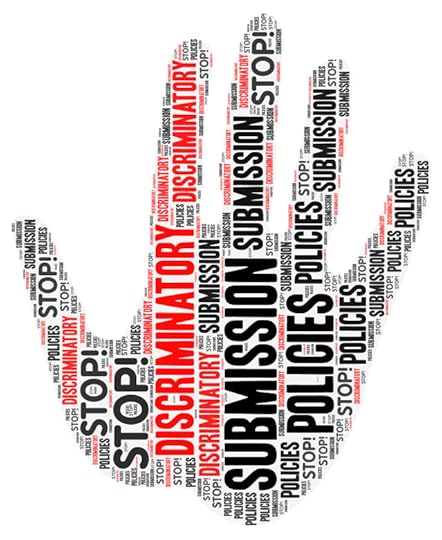
I’ve been part of an ongoing debate examining the presumption that marginalized groups, specifically Black, Indigenous or people of colour (BIPOCs) and those who identify within the LGBTQ2S spectrum are underrepresented in Canadian literature.
The presumption is that because of discrimination by publishers their stories have been deemed not worthy and subsequently haven’t been published. To make up for this injustice, they should receive special privileges when it comes to submitting their stories.
It’s not enough for a publisher to state on their submission page that they encourage submissions from all groups and assure there’s no discrimination in reviewing material, some feel they must waive submissions fees, have special time slots for submissions, even ensure if the author self-identifies as marginalized their story will be get priority treatment.
Whether or not you’re predisposed to “two wrongs not making a right” (discriminating against the mainstream to compensate for what has/is happening to the marginalized) it presents three issues.
1. What does this do to the standard of literature? Shouldn’t acceptance go to the best written, most appropriate story and not be based on race, gender, or other protected characteristics?
2. Who and how has it been determined marginalized authors are underrepresented in Canadian Literature? How are they identified and their identity validated?
3. Policies that continue to prioritize writing by such groups by providing them with special privileges create the perception marginalized writers are less competent or accomplished.
If you’re against discriminatory submission policies, here are some actions you might consider taking:
– don’t submit to publications that discriminate in any way.
– call out such publications for the above said reasons.
– advocate for the removal of these discriminatory messages on submissions pages.
– advocate on behalf of blind judging – editors having no information about the author (including their name) and judging the submission on its creative merit alone.
This is by no means the final word on this issue. The discussion is ongoing and evolving and your comments are welcomed, will be considered and may alter this position.
Let’s talk.
#writers #authors #poets #marginalizedwriters #BIPOCwriters #discrimination #fairness #blindjudging #craft #literature #underrepresentation #selfidentify #submissions #submitting #literarymagizines #publishing
December 19, 2023
My short fiction, Worse Than Death, has be published in The Stygian Lepus – Edition Nine
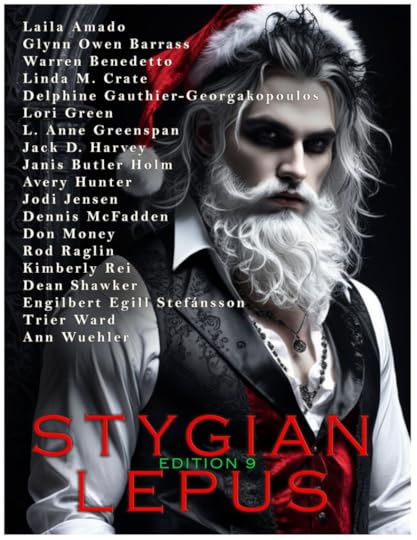
My short fiction, Worse Than Death, has be published in The Stygian Lepus Edition Nine, a monthly digital and print literary magazine available at https://stygianlepus.com/
The editors advise their content “leans to the dark side” which seemed appropriate for this story.
In Dr. Dennis D. Langton’s long career as a practising psychologist, the case of Scott Myers, a privileged and popular college student, was the most frustrating in regard to the resistance of any form of treatment and the resulting horrific outcome for the patient. Equally bizarre was the trigger, a casual sexual encounter with an enigmatic young woman that led to excruciating pain, disfigurement, attempted suicide and subsequent catatonia.
Worse Than Death is transcribed from Dr. Langton’s clinical notes taken during the course of the treatment.
Along with my story, this edition includes 24 works by the following 19 poets and authors:
Call Me Karma by Linda M. Crate
Dora of Boat Landing Road by Ann Wuehler
Eating the Elephant: What You Don’t Know You Know by Kimberly Rei & Dean Shawker
Echoes in the Silence by Avery Hunter
Enter the Apocalypse by Jack D. Harvey
Fine, I am the Monster by Linda M. Crate
Hairy and Scary by Don Money
Holy Mother of the Drowned by Laila Amado
Horned Demon by Janis Butler Holm
Jesus Is My Co-pilot by Delphine Gauthier-Georgakopoulos
Just What I Want by Warren Benedetto
Kings of Winter by Engilbert Egill Stefánsson
Look for the Faces by L. Anne Greenspan
Nothing But A Monster by Linda M. Crate
On an Old Billy Goat by Dennis McFadden
Organ Donor by Trier Ward
Return of the Drummer – Part Four by Jodi Jensen
Rides by Trier Ward
The Gift of Immortality by Lori Green
Vampire Bunny by Janis Butler Holm
Waking by Trier Ward
Walker – Part Four by Glynn Owen Barrass
When Did I Say I was Only Love and Light by Linda M. Crate
Your Society by Linda M. Crate
#shortstories #shortfiction #weirdfiction #horrorfiction #fiction #newfiction #readingcommunity #shortstorylovers #readers
December 15, 2023
If you can’t say anything nice…

One of the misunderstandings(?) I had with some (most?) members of the Canada Writes Facebook (CWF) group before they banned me was my critiques. Many members use the site to publish their poetry or passages from a WIP.
When I see work presented to the public, I assume the writer wants a response. I appreciate reviews and criticisms of my work. The ones I appreciate most are where a thoughtful reader has provided insightful suggestions on how to improve my stories – and they can always be improved. Glowing reviews that extoll my genius (not many of those) are flattering but do little to advance my craft. I assumed other writers wanted the same.
They don’t – or at least on CWF they didn’t. There was a consensus among the members that I was overly harsh when all the person who posted wanted was a “like” or a “love” to fulfill their ongoing fantasy. In other words, I was told if you can’t say something nice, don’t say anything at all (and I thought I was doing them a favour).
How, you might ask, does someone improve at anything with that kind of attitude?
I was never rude and usually edited out the initial sarcasm, but my comments weren’t ambivalent and could sting depending on the thickness of your skin. I mean, who’s got time to try to figure out if it’s a compliment or a criticism? Are we not adults? Have we such fragile egos that one person’s opinion of our writing is going to devastate us, destroy our dream of being an overnight bestseller, or break our spirit beyond repair?
Apparently so.
I’d like my writing to be my one true thing. That means no compromises, no delusion, and being honest with myself and others (We’re talking writing here. In life I’m as duplicitous as anyone else, maybe more so).
So, here’s the dilemma.
Two writers have been very kind and generous regarding my writing specifically and my career generally. That’s not to say their magnanimity has increased my book sales. I’ve said thanks, but I thought I’d like to reciprocate – and review one of their books (you see where this is going?)
Their books are okay, but they’re not great, three stars, maybe four if I factor in they’re error-free and professionally produced – though both are likely the result of buying services from professionals.
I’d like to think when they read my review they’ll acknowledge my intent to make them an even better writer. I hope they’ll consider my constructive comments and suggestions on how their book and/or subsequent writing might be improved.
But I think they’ll be pissed ¬– sort of like being bit by the dog you just fed.
I used to think I had a responsibility to write and post an honest review of any book I’d read – to the author and readers. Now I’m wondering, what’s the point?
Ralph Waldo Emerson said: “A little integrity is better than any career.” I might have to rethink that – the integrity part.
December 9, 2023
My short story, Cryptic Messages, has been included in The Writer’s Workout annual anthology Tales of the Strange!
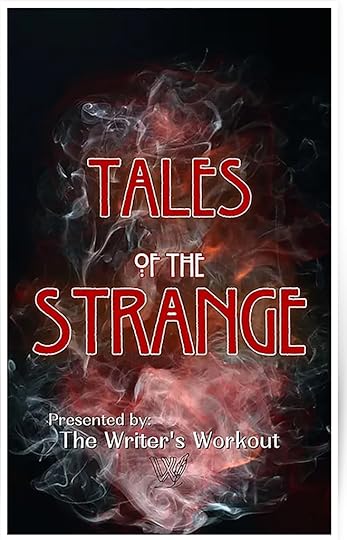
“Ernie’s weird but the cryptic messages he’s getting from unidentified sources reminding him to attend a meeting he knows nothing about, are making him even more so.”
My short story, Cryptic Messages, has been included in The Writer’s Workout annual anthology Tales of the Strange now available as an e-book and paperback at https://www.amazon.com/dp/B0CP738Q7J?fbclid=IwAR2JgJXNzKruWMoTi1z7TL26csSmVwJGaW_54crXh8vU3RKampRX5wyjhsQ
This themed anthology accepts work from writers around the world for six months at a time. These fiction pieces are typically longer than their literary journal allows, resulting in a deeper exploration of the theme.
The Writer’s Workout is a global charity working to improve literacy through creative writing. They hold competitions, workshops, open calls, and discussions; provide motivation, tips, prompts, and giveaways; and offer a community rich in culture and skill.
To learn more about how The Writer’s Workout strengthens the writing community visit https://www.writersworkout.net/donate
Cryptic Messages was previously published in
Bewildering Stories, Edition 986
#talesofthestrange#thewritersworkout @thewritersworkout #shortstories#shortstoryanthology
December 5, 2023
I’ve been banned from Canada Writes Facebook page. Here’s why.
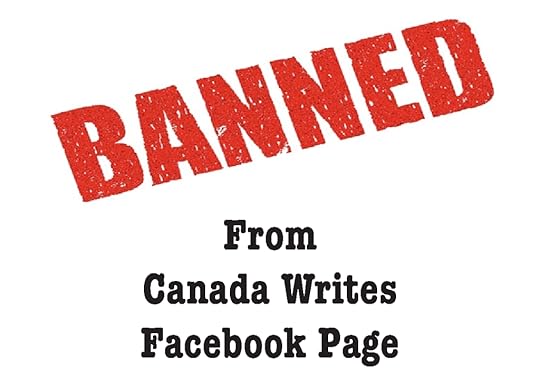
It appears I have been banned from the Canada Writes Facebook group.
I’m not surprised. I’ve been part of an ongoing debate on the site which has resulted in the banning of other members as well.
The problem, or my problem as in “What’s your problem, Rod?”, at least as I see it, is some of the member’s unwillingness or inability to examine the assumption that marginalized groups, specifically Black, Indigenous and people of colour (BIPOCs) and those who identify within the LGBTQ2S spectrum are underrepresented in Canadian literature.
The presumption is that because of discrimination by mainstream society their stories have been deemed not worthy and subsequently they’ve haven’t been published. To make up for this injustice, they should receive special privileges when it comes to submitting their stories. It’s not enough for a publisher to state on their submission page that they encourage submissions from marginalized groups and assure there is no discrimination in reviewing material, some feel they must waive submissions fees, have special time slots for submissions, even ensure if the author self-identifies as marginalized their story will be get priority treatment.
The latest has been Random House Canada that has “opened its submission policy exclusively to LGBTQIA2S+ and BIPOC writers, as well as those from other traditionally underrepresented communities. Effective immediately, unsolicited and unagented work can be sent directly to their editors within the RHC division.”
Whether or not you’re predisposed to “two wrongs not making a right” (discriminating against the mainstream to compensate for what is happening to the marginalized) it presented two issues for me.
The first was and still is what does that do to the standard of literature? Shouldn’t acceptance go to the best written, most appropriate story and not be based on race, gender, or other protected characteristics?
The second is, who and how has it been determined marginalized authors are underrepresented in Canadian Literature?
I posted these questions a few times on Canada Writes Facebook page and it almost always created a firestorm that inevitably ended badly with rudeness and name calling. This wasn’t my intent so I stopped posting on these issues. However, when I visited the site and saw they were being addressed (and they frequently were), I entered into the debate.
I enjoyed the exchange of differing opinions and, though I admit at times it got a bit spirited (I tend to be sarcastic) I was never rude or insulting. On the other hand I was called a bigot, a racist and it was frequently suggested that I was motivated because of the lack of success I’ve had as a writer – which is true, not the part about my motives, but my lack of success.
I learned a lot, but no one could answer my questions, at least to my satisfaction. The solution, which I saw as fair and equitable to everyone, was that editors should make their decisions without knowing anything about the authors. I became an advocate for blind judging.
Then I was banned from the group.
I’m disappointed. I think this issue is important and I thought (hoped) we could discuss it. But more and more now, it seems if you challenge certain assumptions you’re insulted, then intimidated and, if you don’t shut up or come in line, ultimately, cancelled.
I don’t think this issue is going away, but my being banned may send a chill through like-minded members who value their Canada Writes membership more than I do. On the other hand, probably no one will notice.
Oh, well. Less time on Facebook is more time to write.
#writingcommunity #writers #authors #censorship #intimidation #cancelculture #banning #CanadaWrites #literature #canadawritesfacebookpage #prejudice #bias #CBC #margjnalizedwiters #publishing



